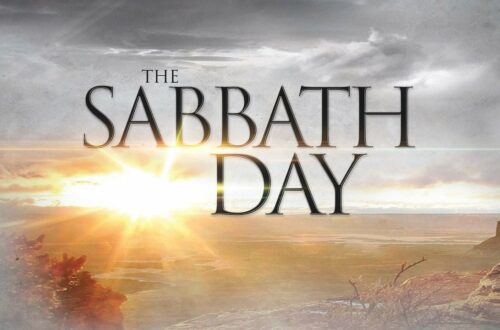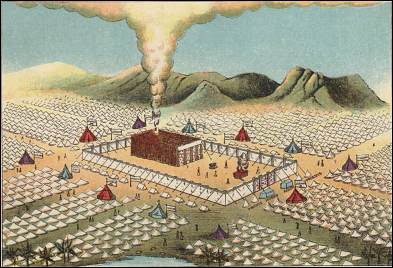Jacob and Esau as rivals
Title: Jacob and Esau as rivals
Aim: To highlight the importance of making the things of God, not the things of the world, our highest priority.
Scripture: Genesis 25:19–34
The Birth of Esau and Jacob, Genesis 25:19-26
As Genesis 25:19 and 20 state, Abraham was the father of Isaac, who was 40 years old when he married Rebekah. Genesis 24 (the longest chapter in the book) records how Abraham’s chief servant found Rebekah as a wife for Isaac.
As the daughter of Bethuel, Rebekah was a near relative of Abraham’s family. The text says that Bethuel was an Aramean from Paddan Aram (Deut. 26:5), which means “Plain of Aram” or “Field of Aram.”
The above is another name for Aram Naharaim (Gen. 24:10), which literally means “Aram of the two rivers.” The reference is to the Euphrates and Tigris rivers in northwest Mesopotamia.
A comparison of 25:7 and 20 indicates that Isaac married 35 years before Abraham died. Also, a comparison of verses 20 and 26 reveals that Isaac had to wait 20 years—from the time he was 40, when he married Rebekah, until he was 60—before Rebekah gave birth to Esau and Jacob.
Moreover, at that time, Abraham would have been 160 years old. Since the patriarch died at the age of 175, he lived to see the fraternal twins reach the age of 15 (when Isaac was 75 years old).
According to verse 20, Rebekah was the sister of Laban the Aramean. He is introduced 24:29-31, where the text relates that he went out to meet the chief servant of Abraham and invited the visitor to lodge at the family home.
Laban also played a prominent role in the rest of the account recorded in the chapter. For instance, after the servant rehearsed his encounter with Rebekah, Laban and Bethuel affirmed that the Lord had brought the servant to the area and that God had chosen Rebekah to become Isaac’s wife (vv. 50-51).
Also, it was Laban and his mother who suggested that Rebekah stay at least 10 days before leaving her family to marry Isaac (v. 55). Years later, Rebekah had Jacob flee to his uncle, Laban, to escape from Esau, who threatened to kill his twin brother for stealing the family blessing from him (27:43-45).
Long before the above episode, Rebekah—like Sarah (11:30)—was childless, and her inability to conceive and bear a son placed the fulfillment of the covenantal promises in jeopardy. A superficial reading of 25:21 might leave the impression that Isaac prayed once or twice and then God answered the patriarch’s request. Yet, two decades passed before the Lord enabled Rebekah to become pregnant (compare verses 20 and 26). From this we see that it was God’s grace that enabled Isaac’s wife to conceive.
In the interim, as time wore on, Isaac became increasingly concerned about his lack of children. Undoubtedly, the Lord was testing Isaac’s faith, as He had previously tested Abraham’s faith.
Indeed, many years earlier the patriarch had waited patiently for Isaac’s birth. God knew all along what He would do, but He waited to do it in cooperation with the prayers of such individuals as Isaac and Abraham.
The Lord gave Isaac not one son but two. Prior to their births, the children were struggling inside Rebekah (v. 22). The underlying Hebrew verb suggests an extraordinarily vigorous tussle between the twins.
The activity within Rebekah’s womb concerned her so much that she wondered why it was happening to her. There also seems to be a hint of discouragement in her question as she despaired over what the jostling could mean for the future of her babies.
Understandably, Rebekah decided to ask the Lord for clarification. There is no explanation given as to how Rebekah made her inquiry.
In any case, Rebekah learned that she was pregnant with fraternal twins and that their future would be far from mundane. The Lord revealed that two nations and groups of people (Edom and Israel, respectively) would arise from the two children.
Esau and Jacob would struggle (or become intense rivals) with each other and so would the nations emerging from them. Contrary to custom, however, the descendants of Jacob (the younger twin) would grow stronger than and dominate the descendants of Esau (the older twin; v. 23).
In short, the younger son would receive the blessings of the Abrahamic covenant. This surprising turn of events reflected the Lord’s will. For this reason, it was unnecessary for Jacob to use trickery and deceit to gain the upper hand over Esau.
The importance of God’s statement cannot be overemphasized. In Romans 9, Paul noted that the Lord made His choice regarding the promised line even before the twins were ever born and prior to them having done anything good or bad (vv. 10-11).
God’s choice of Jacob over Esau was not based on the actions of either offspring. Instead, God simply made a sovereign decision. That selection involved not only the promised line, but also the fact that the “older” (v. 12) sibling, Esau, would serve the “younger” sibling, Jacob.
Although it would be many years before Jacob displayed maturity in his relationship with God, the characters of Esau and Jacob would eventually confirm the wisdom of the Lord’s decision. Indeed, while Jacob takes his place in the honor roll of faith in Hebrews 11, Jacob’s brother, Esau, became a classic case of godlessness.
Esau was a prototype of the secular person, for he failed to value what he should have highly prized. Specifically, Esau bartered away his birthright.
Perhaps the most difficult sentence to understand is found in Romans 9:13: “Just as it is written: Jacob I loved, but Esau I hated” (Mal. 1:2-3). Paul was not talking about an emotional or temperamental hatred. This hatred was not absolute, but was relative to a higher choice. Used in this way, the Greek verb translated “hated” (Rom. 9:13) can carry the meaning, “loved less.”
Experts also tell us that thousands of years ago, the word “hate” was often used figuratively. In the present context regarding the promised line, the phrase “Jacob I loved, but Esau I hated” carries the implied meaning, “Jacob I chose, but Esau I rejected.” The fact that God did not emotionally “hate” Esau is clear from the fact that the Lord bestowed many temporal blessings on Esau, his family, and his descendants.
Eventually the time arrived for Rebekah to give birth to the fraternal twins in her womb (Gen. 25:24). The first infant to emerge was reddish all over his body. Also, he was covered with so much hair that it appeared as if he was wearing an animal skin (v. 25).
The baby’s appearance was a sign of things to come. For instance, “red” translates the Hebrew term, ’admoni, which is a wordplay on the Edomites, the descendants of Esau. Also, “hairy” renders the Hebrew term, se’ar, which is a word play on Mount Seir, where the Edomites later lived (36:8, 20). Finally, the name “Esau” (24:25) may also mean “hairy.”
Not long afterward, the other twin appeared from Rebekah’s womb with his hand clutching the heel of Esau (25:26). The name given the second twin—“Jacob” (Hebrew, ya’aqov)—is a play on the noun for “heel” (’aqev). The implied meaning is that one day Jacob would take by the heel or supplant his brother.
Years later, in 27:36, Esau gave a negative connotation to Jacob’s name (Jer. 9:4; Hos. 12:3). The older twin, being enraged at Jacob’s theft of the family blessing, drew attention to the unsavory connotation of someone who “takes advantage of,” “deceives,” or “cheats.”
In actuality, Jacob’s name is derived from the Hebrew verb, aqav, which means “to follow closely,” “to guard,” and “to protect.” One might imagine a cohort of soldiers positioned at the back of a military formation to secure the flank of those located toward the front. Based on this information, “Jacob” is possibly an abbreviation of ya’aqov-el, which means “may God protect (him)” or “God has protected.”
When Jacob was decades older, the Lord renamed the patriarch, “Israel,” which may mean “one who struggles with God,” “one who perseveres with God,” or “one whom God has justified.” (Specialists debate the exact lexical meaning of the Hebrew noun.) The new name served as a sign of Jacob’s spiritual struggle (Gen. 32:28; 35:10).
“Israel” is the same proper name that Jacob’s descendants eventually adopted as their political and religious title. Although Jacob was characterized by deceitfulness in his earlier days, toward the end of his life, he became known for his genuine faith and integrity (Heb. 11:21).
The Selling of the Birthright: Genesis 25:27-34
By the time the fraternal twins reached adulthood, Esau had become a cunning “hunter” (v. 27; Hebrew, tsa’yid) who enjoyed roaming the open fields in search of wild game. This lifestyle suited his extroverted, rough-and-ready personality.
In contrast, Jacob was more introverted, calculating, and domesticated. He was also calm and even-tempered, preferring to live in tents. On the one hand, because Isaac enjoyed feasting on venison, he loved Esau. On the other hand, Rebekah favored Jacob (v. 28).
The displays of favoritism by the parents caused great problems in the home. It deepened the rivalry between the brothers, and eventually broke apart the family.
The narrative spotlights one incident in the lives of the fraternal twins. Jacob had been “cooking” (v. 29; or “boiling”; Hebrew, zyd) a brown-red, lentil stew when Esau returned from hunting in the open fields exhausted and hungry.
Apparently, Esau’s efforts that day to hunt wild game had failed. When he spotted some of the stew Jacob had made, Esau demanded a bowl full of it (v. 30).
Just as the stew was brown-red in color, so too Esau’s descendants would be called “Edom,” which means “red.” This designation was fitting, since the place where they eventually settled was characterized by reddish-colored hills.
The above episode depicts Esau as an impulsive and insistent person. Because he felt as if his hunger could not wait, he presumed that Jacob would at once satisfy his brother’s demand for a ready-to-eat meal.
There is a reversal of roles between Jacob and Esau that is highlighted by the Hebrew verbs used in verses 27 and 29, respectively, to describe the twins. The younger brother known for cooking (Hebrew, zyd) entrapped the older brother known for hunting (Hebrew, tsa’yid). It is as if Esau arrived on the scene like a famished beast, only to be snared by his more civilized and quieter sibling.
In Bible times, it was customary for the firstborn son (whether the child of a legal wife or a concubine) to inherit the rights, or privileges, of the family. This typically included receiving the family name and titles.
The above custom also included becoming the leader of the family and the one through whom the line was continued. Further, because a child was the firstborn, he usually inherited a double portion of the family estate.
Archaeologists have discovered that these customs were not absolutely observed by people in the ancient Near East, and the Bible gives evidence of that as well. For example, a father could ignore the rights of the firstborn and give the inheritance to a younger son (48:13-20). A father could also disregard the firstborn son of a concubine in favor of a son he had later through a legal wife (21:10).
In addition to the birthright, there was the family blessing. This consisted of the father orally conveying his authority and possessions to his children sometime before his death.
The father usually followed an informal ceremony in which he first prayed that God’s favor would rest upon one of his descendants (most often the firstborn). Then, the father would divide his power and property among his children. Once the family blessing was conferred, it was considered irrevocable.
Genesis 27:1-40 relates how Jacob stole the family blessing from Esau, while 25:29-34 explains how Esau sold his birthright to Jacob. In the earlier incident, Jacob said he was willing to give his brother some stew, but only if Esau would accept it as the price for his family inheritance (v. 31).
Perhaps Jacob recalled the prophecy made at his birth that the “older” (v. 23) would “serve the younger.” If so, he was ready to make the prediction come true.
Jacob did so by exploiting his brother and seizing the birthright from him. In Isaac’s family, this included the promises of the covenant God had made with Abraham.
Esau declared that he was dying of starvation. From his shortsighted perspective, the birthright had little immediate value (v. 32). As noted earlier, like a skilled hunter who was ready to pounce on his weakened prey, Jacob insisted that Esau swear an oath that he was transferring his inheritance rights (v. 33).
When Esau agreed to the exchange, Jacob gave his older brother some bread and lentil stew, which Esau promptly consumed before getting up and leaving. In this way, he despised his birthright. Expressed differently, he treated the family inheritance with contempt.
If Esau had valued the great covenant blessings given to Abraham and Isaac, he would not have considered selling his birthright under any circumstances. Although there were temporal material benefits to the covenant, the promises revolved around God’s eternal, redemptive program.
We can assume that Jacob, despite his many flaws, wanted to participate in the eternal blessings. He desired a place in God’s plan to bless the whole world. In contrast, Esau had little regard for God’s salvific work.
For thought and application
“Profane,” “secular,” and “godless” are terms that aptly describe the character of Esau. Sadly, he represents the mindset and lifestyle of many people in our day.
The impression is of individuals who care little or nothing about the things of God. They are irreligious and indifferent to eternal, spiritual realities, as if the here-and-now is all that matters.
The episode involving Esau and Jacob gives us an opportunity to examine our values. Are we driven by our physical appetites or does the prospect of knowing God in a closer and more personal way motivate our hearts and lives?
We need to consider seriously what James 4:4 declares about friendship with the secular, pagan society. The result of such is enmity against God. Indeed, all who drink heavily from the cesspool of the heathen world system are the Lord’s enemies.
At first, such a pronouncement might seem harsh and feel excessive; yet, before we hastily dismiss what has just been said, consider 1 John 2:15-17. There the apostle encouraged believers to take the high road mandated by their divine calling. He commanded his readers not to love the world or anything in it.
At every turn this ungodly, humanistic system opposes God and actively looks to subvert His plan of salvation for humankind. For this reason, John wanted us to understand that one cannot love that world and all that it has to offer and love God at the same time.
An obvious choice must be made—love God and hate the world or love the world and hate God. The two options are mutually exclusive.



